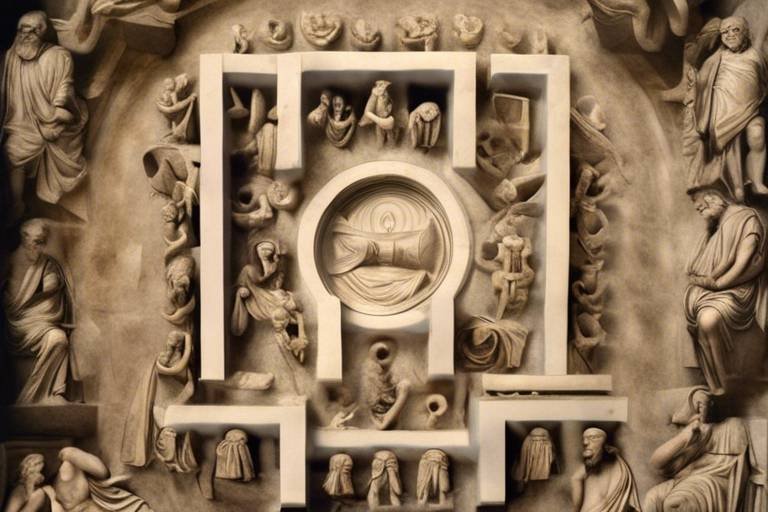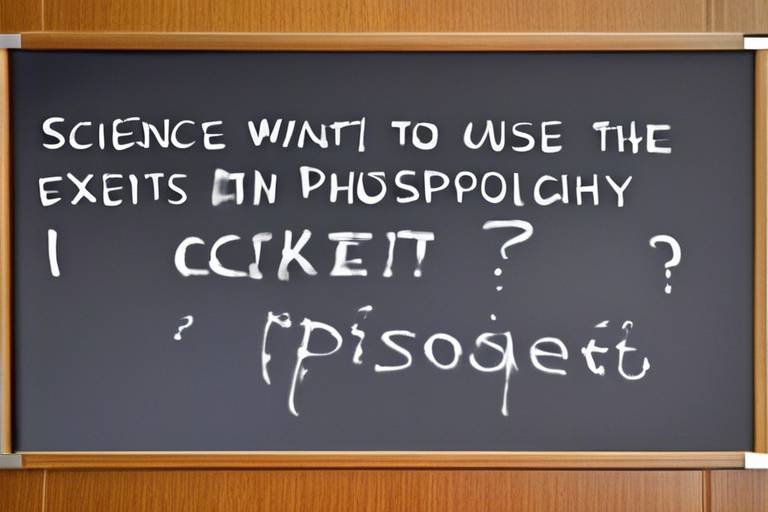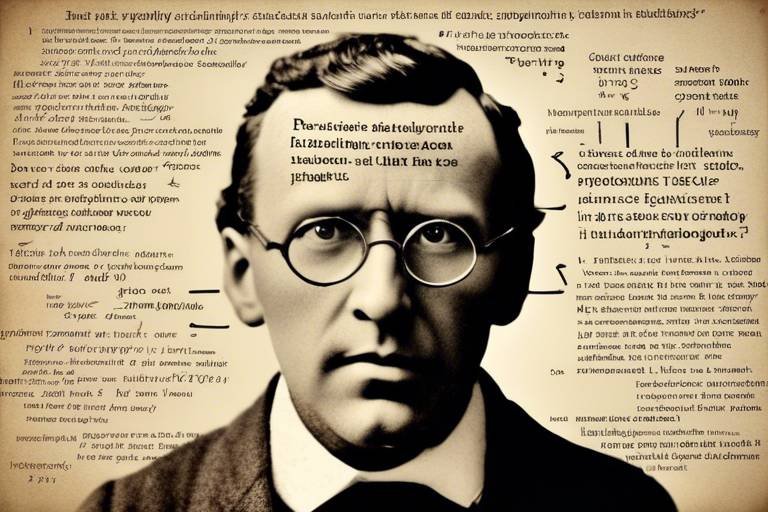What Does Quantum Physics Teach us About Reality?
Quantum physics, often regarded as the most perplexing branch of science, offers a stunning glimpse into the very fabric of reality. It challenges our everyday perceptions and invites us to rethink the universe's fundamental workings. Imagine peering into a world where particles can exist in multiple states at once, where the act of observation can alter outcomes, and where everything is interconnected in ways that defy common sense. This isn’t just theoretical musings; it’s a revolutionary perspective that has implications for everything from technology to philosophy.
At its core, quantum physics teaches us that reality is not as straightforward as we once believed. Traditional physics, with its deterministic equations and predictable outcomes, provides a comforting framework for understanding the world. However, quantum mechanics shatters this illusion, revealing a realm where uncertainty reigns supreme. It's like stepping into a surreal painting where the rules of logic and causality seem to bend and twist, leaving us in awe of the mysteries that lie beneath the surface of our existence.
One of the most captivating aspects of quantum physics is its ability to blur the lines between observation and reality. When we observe a quantum particle, we inadvertently influence its behavior. This phenomenon raises profound questions: Does our consciousness play a role in shaping reality? Are we merely passive observers, or do we actively participate in the unfolding of events? These inquiries resonate deeply, prompting us to reflect on our place in the universe and the nature of existence itself.
Moreover, quantum physics introduces us to concepts like entanglement, where particles become intertwined in such a way that the state of one instantly influences the state of another, regardless of the distance separating them. This interconnectedness challenges our conventional understanding of space and time, suggesting that the universe is a far more complex tapestry than we ever imagined. It’s as if we are all threads in a vast cosmic web, where every action has the potential to ripple across the fabric of reality.
As we delve deeper into the implications of quantum mechanics, we begin to see how it informs not just our scientific understanding, but also our philosophical inquiries. Questions about determinism, free will, and the nature of truth come to the forefront, reshaping our understanding of what it means to exist. The interplay between quantum mechanics and philosophy is a fertile ground for exploration, inviting thinkers to ponder the very essence of reality and our perception of it.
In the realm of technology, the teachings of quantum physics are already making waves. Innovations in quantum computing and cryptography are just the tip of the iceberg. As we harness the principles of quantum mechanics, we unlock new potentials that could revolutionize industries and redefine our relationship with technology. This is not just science fiction; it is the tangible outcome of a deeper understanding of reality, transforming abstract concepts into practical applications.
Looking ahead, the future of quantum research is brimming with promise. Scientists are continually probing the mysteries of the quantum realm, seeking answers to questions that could redefine our understanding of the universe. Each breakthrough brings us closer to unraveling the complexities of reality, and who knows what astonishing discoveries lie just around the corner? The journey into the depths of quantum physics is not merely an academic pursuit; it is a quest that could change everything we know about existence.
- What is quantum physics? Quantum physics is a branch of physics that studies the behavior of matter and energy at the smallest scales, including atoms and subatomic particles.
- How does quantum physics differ from classical physics? Unlike classical physics, which relies on deterministic laws, quantum physics introduces concepts of probability and uncertainty, fundamentally altering our understanding of reality.
- What is wave-particle duality? Wave-particle duality is the principle that particles, such as electrons and photons, exhibit both wave-like and particle-like properties, depending on the experiment being conducted.
- What is quantum entanglement? Quantum entanglement is a phenomenon where two or more particles become linked, such that the state of one particle instantly influences the state of the other, regardless of distance.
- Why is the observer effect significant? The observer effect illustrates that the act of measurement can affect a quantum system, prompting questions about the role of consciousness in shaping reality.
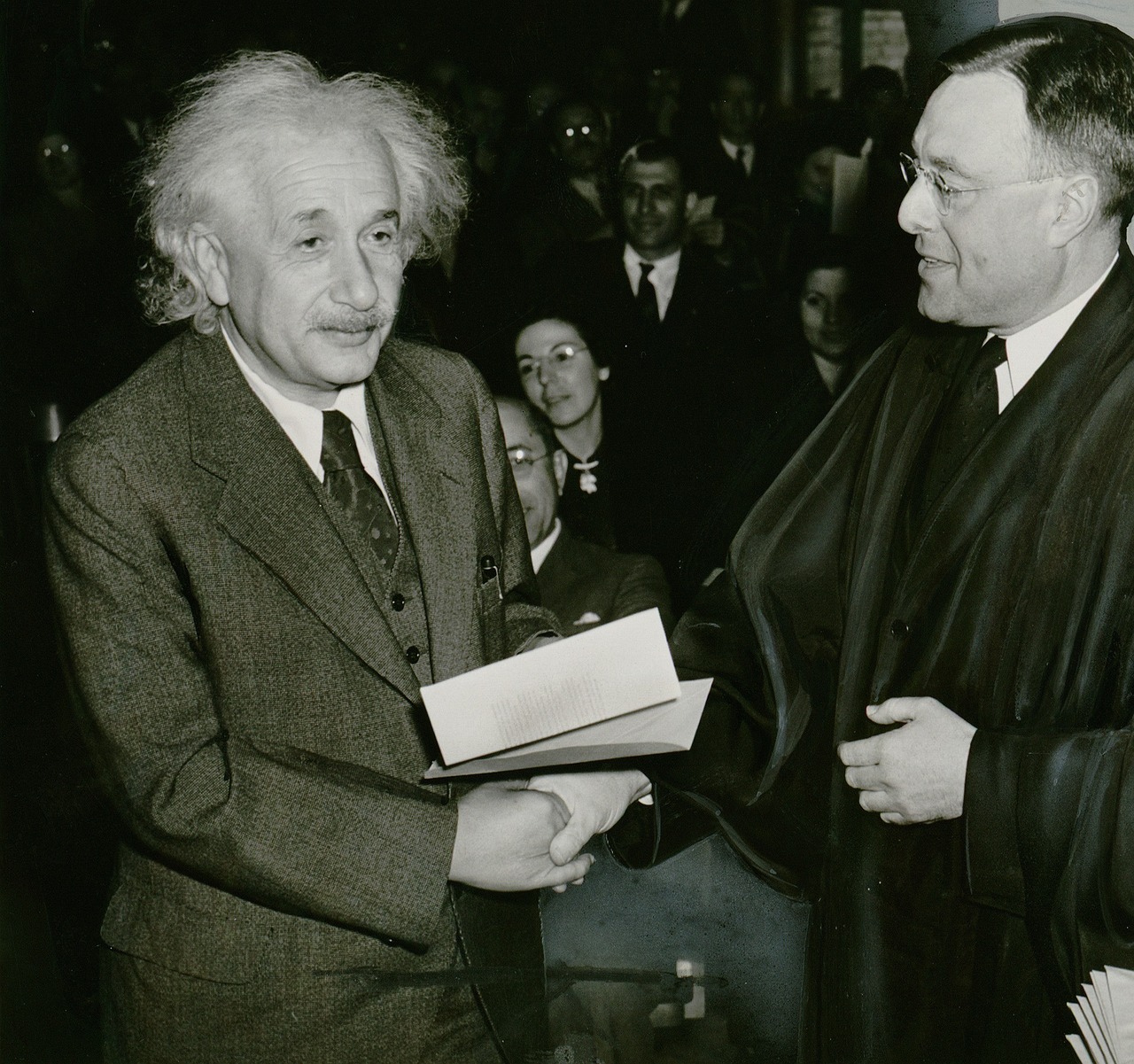
The Basics of Quantum Physics
Quantum physics, at its core, is a branch of physics that delves into the incredibly small particles that make up our universe. Unlike classical physics, which deals with the macroscopic world of everyday objects, quantum physics explores phenomena at the atomic and subatomic levels. This field of study fundamentally challenges our traditional understanding of reality, introducing concepts that can seem downright bizarre. For instance, while classical physics operates under the assumption that objects have definite properties, quantum physics reveals that particles can exist in a state of uncertainty until they are measured.
To grasp the essence of quantum physics, one must familiarize themselves with a few foundational principles. These include:
- Quantization: Energy exists in discrete units, or "quanta," rather than in a continuous flow.
- Wave-Particle Duality: Particles, such as electrons, can exhibit properties of both particles and waves, depending on how we observe them.
- Uncertainty Principle: Proposed by Werner Heisenberg, this principle states that certain pairs of properties, like position and momentum, cannot be simultaneously measured with arbitrary precision.
- Superposition: Particles can exist in multiple states at once until an observation collapses them into a single state.
These principles form the bedrock of quantum mechanics, a theory that has not only expanded our understanding of the universe but also led to revolutionary technologies. Imagine a world where the very fabric of reality is interwoven with uncertainty and interconnectedness. It's a world where the rules of the game are not what they seem, and where the act of observing can alter the outcome of an event. This is the intriguing realm of quantum physics.
One of the most captivating aspects of quantum physics is how it diverges from classical physics. In the classical realm, objects are predictable, and their behaviors can be calculated with precision. However, in the quantum world, unpredictability reigns supreme. This shift in perspective invites us to reconsider not just how we view the universe but also our place within it. Are we mere observers, or do we play a role in shaping reality itself? This question leads us to explore deeper philosophical implications as we continue to unravel the mysteries of the quantum realm.
As we venture further into this fascinating field, it's essential to recognize that quantum physics is not just an abstract concept confined to laboratories. Its principles are the very foundation of various technologies we use today, from lasers to semiconductors. Understanding the basics of quantum physics equips us with the knowledge to appreciate the profound implications it has on our lives and the universe as a whole.

Wave-Particle Duality
Wave-particle duality is one of the most intriguing and perplexing concepts in quantum physics. It challenges our traditional understanding of matter and energy, suggesting that particles, such as electrons and photons, can behave both as discrete particles and as continuous waves. Imagine trying to catch a fish in a pond; sometimes it’s darting around like a particle, and at other times, it spreads out like ripples across the surface. This duality forces us to rethink how we perceive the fundamental building blocks of the universe.
To illustrate this concept, consider the famous double-slit experiment. When light is shone through two closely spaced slits, it creates an interference pattern on a screen behind the slits, characteristic of waves. However, if we observe the particles as they pass through the slits, they behave like particles, hitting the screen in discrete spots. This means that the very act of observation can influence how these entities behave. It's as if the universe is playing a game of hide and seek, where the rules change based on whether we are watching or not!
This duality has profound implications not only for physics but also for our understanding of reality itself. It suggests that the universe is not as straightforward as we once thought. Instead of being strictly classified as either waves or particles, entities in the quantum realm can exist in a state that embodies both. This is akin to a chameleon that can change its color depending on its environment. The implications of this are staggering, as it hints at a reality that is fundamentally interconnected and fluid.
Moreover, wave-particle duality has led to the development of various technologies that leverage these quantum principles. For instance, lasers, which rely on the wave properties of light, are now ubiquitous in our daily lives, used in everything from barcode scanners to eye surgery. The ability to harness both wave and particle characteristics has opened up a world of possibilities in science and technology.
In summary, wave-particle duality is not merely a scientific curiosity but a profound insight into the nature of reality. It challenges us to reconsider our perceptions and invites us to explore the mysteries of the universe with an open mind. As we delve deeper into the quantum world, we may discover that the boundaries between waves and particles are not as rigid as we once believed. Instead, they may just be different aspects of the same underlying reality, waiting to be understood.
- What is wave-particle duality?
Wave-particle duality is the concept that every particle or quantum entity can be described as either a particle or a wave, depending on the experiment being conducted. - How does the double-slit experiment demonstrate wave-particle duality?
The double-slit experiment shows that light can create an interference pattern (wave behavior) when not observed, but behaves like particles when observed, highlighting the dual nature of quantum entities. - Why is wave-particle duality important?
This concept is crucial for understanding quantum mechanics and has led to technological advancements such as lasers and quantum computing.

Quantum Entanglement
Quantum entanglement is often described as one of the most mind-boggling phenomena in quantum physics. Imagine two particles, like a pair of dancers, perfectly synchronized in a cosmic ballet. No matter how far apart they are—whether inches or light-years—any change to one dancer affects the other instantaneously. This peculiar connection defies our traditional understanding of space and time, leading many to ponder: how can information travel faster than light? It's as if these particles are communicating in a secret language, one that we are only beginning to decipher.
At its core, entanglement suggests that particles can become intertwined in such a way that the state of one particle directly influences the state of another. This relationship remains intact regardless of the distance separating them. To illustrate, consider a pair of entangled particles, A and B. If we measure the state of particle A and find it to be "up," particle B will instantaneously be "down," even if it is light-years away. This phenomenon challenges our classical notions of locality and causality, raising profound questions about the very fabric of reality.
The implications of quantum entanglement extend beyond theoretical musings; they have real-world applications that are reshaping technology. For instance, entanglement is a cornerstone of quantum computing, where it enables qubits to perform complex calculations at speeds unimaginable with classical computers. Moreover, it plays a vital role in quantum cryptography, providing a level of security that is theoretically unbreakable. In a world where data breaches are rampant, entangled particles offer a beacon of hope for secure communication.
However, entanglement also invites philosophical discussions about the interconnectedness of the universe. If particles can be so intimately linked, what does that say about the nature of reality itself? Are we all, in some way, entangled with one another? This leads to a broader inquiry into the nature of existence and our place within it. Are we merely isolated beings, or are we part of a vast, interconnected web of reality? The answers to these questions may redefine our understanding of consciousness and existence.
In summary, quantum entanglement is not just a quirky aspect of quantum physics; it’s a profound insight into the interconnectedness of all things. As we delve deeper into this phenomenon, we uncover not only the mechanics of the universe but also the philosophical implications that challenge our perceptions of reality. The dance of entangled particles serves as a reminder that the universe is far more intricate than we can imagine, urging us to keep questioning and exploring the depths of existence.

The Observer Effect
The observer effect is one of the most mind-bending concepts in quantum physics, and it challenges our fundamental understanding of reality. At its core, the observer effect suggests that the act of observing a quantum system can actually influence its behavior. Imagine you're peeking into a room where a child is playing hide and seek; your mere presence changes how the child behaves. This analogy captures the essence of the observer effect in the quantum realm, where the act of measurement alters the very state of what is being measured.
In classical physics, we often assume that observation is a passive act—like watching a movie unfold without affecting the plot. However, in the quantum world, things are far more intricate. When we measure a particle, we are not just observing it; we are interacting with it in a way that can change its properties. This raises profound questions: Is reality something that exists independently of our observation, or is it shaped by our consciousness? Are we merely spectators in a cosmic play, or do we actively shape the narrative?
To illustrate this concept, consider the famous double-slit experiment. When particles like electrons are fired at a barrier with two slits, they behave like waves, creating an interference pattern on the other side. However, when we set up a measurement to determine which slit the particle goes through, the interference pattern disappears, and the particles behave like individual particles instead of waves. This phenomenon highlights how our act of measurement collapses the wave function, forcing the particle into a definite state. It’s as if the universe is saying, “You’re watching me, so I’ll behave differently!”
This leads us to ponder the implications of the observer effect not just in physics, but in our everyday lives. If our observations can influence reality at a quantum level, what does that say about our perceptions and beliefs? Could it mean that our thoughts and intentions have a tangible impact on the world around us? It's a tantalizing idea, one that blurs the lines between science and philosophy.
Moreover, the observer effect has sparked debates among scientists and philosophers alike. Some argue that it suggests a participatory universe, where consciousness plays a crucial role in the unfolding of reality. Others contend that it merely reflects the limitations of our measurement tools and understanding. Regardless, the observer effect compels us to reconsider our place in the universe and the nature of the reality we inhabit.
In conclusion, the observer effect is not merely a quirky quirk of quantum mechanics; it’s a gateway into the profound mysteries of existence. It challenges us to think deeply about the nature of reality, perception, and the role of consciousness. As we continue to explore the quantum realm, we may find that the answers to these questions are more surprising and transformative than we ever imagined.
- What is the observer effect in quantum physics? The observer effect refers to the phenomenon where the act of measuring or observing a quantum system alters its state, leading to different outcomes.
- How does the observer effect relate to the double-slit experiment? In the double-slit experiment, particles behave like waves until they are measured, at which point they act like particles, demonstrating the observer effect.
- Does the observer effect imply that consciousness affects reality? While some interpretations suggest that consciousness plays a role in shaping reality, this remains a topic of debate among scientists and philosophers.
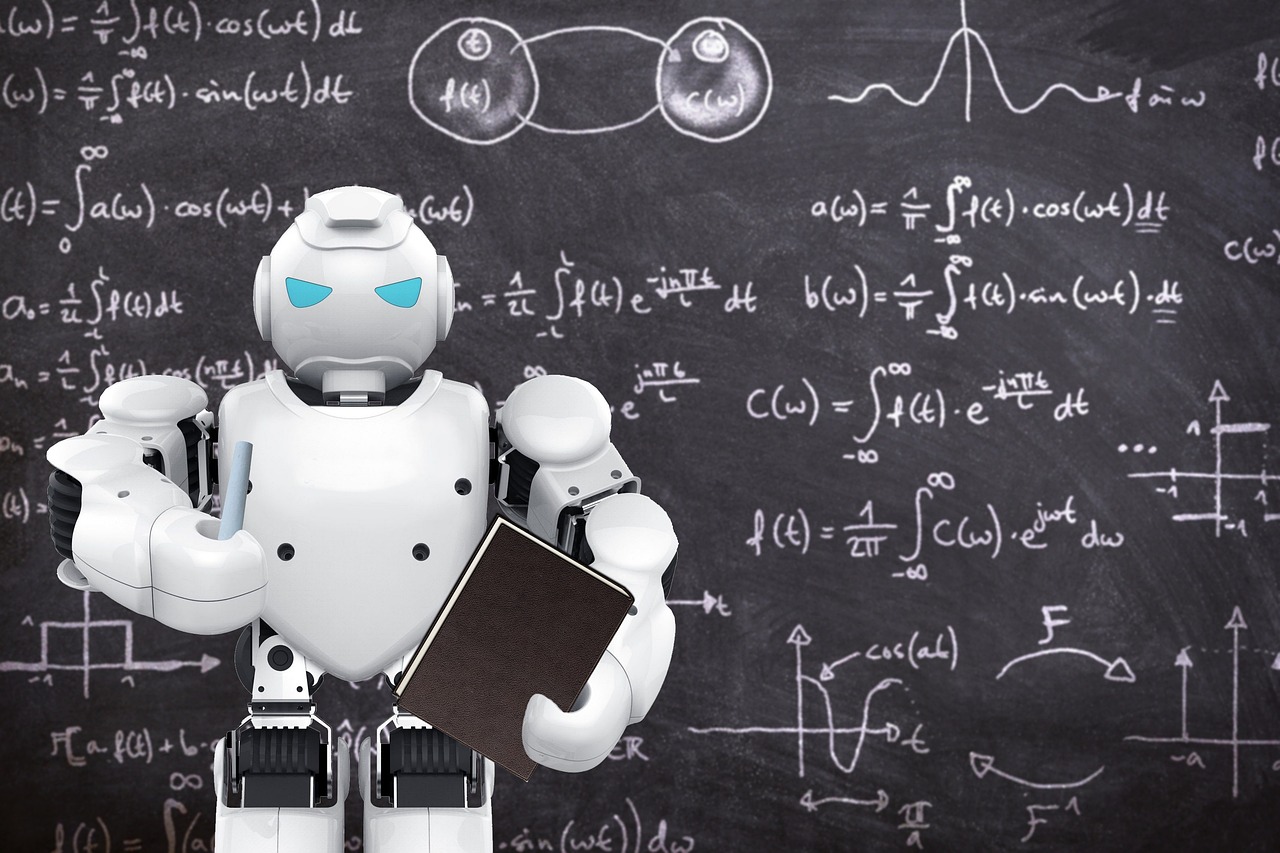
Superposition and Reality
Superposition is one of the most mind-bending concepts in quantum physics, and it challenges everything we think we know about the nature of reality. Imagine a coin spinning in the air: while it's in motion, it isn't just heads or tails—it's both at the same time! This fascinating idea forms the basis of superposition, where particles can exist in multiple states simultaneously until they are observed or measured. It's as if reality itself holds its breath, waiting for us to take a peek and decide which state it should "collapse" into.
Think about it: if a particle can be in several states at once, what does that imply about the world around us? This principle suggests that reality is not as fixed as we once believed. Instead, it can be seen as a vast tapestry of potentialities, where every possibility exists until we make a choice or conduct an experiment. This brings us to a crucial question: Are we merely observers in a universe filled with infinite possibilities, or do our actions play a role in shaping what becomes real?
To illustrate this concept, consider the famous thought experiment known as Schrödinger's Cat. In this scenario, a cat is placed in a sealed box with a radioactive atom. If the atom decays, it triggers a mechanism that kills the cat; if it doesn't, the cat lives. Until we open the box and observe the situation, the cat is considered to be both alive and dead—existing in a superposition of states. This paradox raises profound implications about life, existence, and the very fabric of reality itself.
Now, let’s break down how superposition influences our understanding of reality:
- Determinism vs. Indeterminism: Superposition challenges the classical view of determinism, where future states are predictable based on initial conditions. Instead, it introduces a probabilistic nature to reality, where outcomes are not certain until measured.
- Reality as a Construct: If particles can exist in multiple states, it raises questions about whether reality is an objective truth or a subjective experience shaped by observation.
- Implications for Consciousness: The connection between observation and the state of particles leads to intriguing discussions about the role of consciousness in defining reality. Are we active participants in the universe, or merely passive observers?
In essence, superposition invites us to rethink our understanding of existence. It suggests that the universe is not a static entity but a dynamic interplay of possibilities, waiting for our engagement to manifest definite outcomes. This realization can be both exhilarating and daunting, as it implies that we hold a significant role in the unfolding of reality itself.
As we continue to explore the implications of superposition, it becomes clear that our understanding of reality is still evolving. Scientists are delving deeper into quantum mechanics, seeking to unravel the mysteries of how superposition works and its impact on everything from technology to philosophy. The journey into this uncharted territory not only expands our knowledge but also invites us to ponder the very nature of existence and our place within it.
- What is superposition in quantum physics? Superposition refers to the ability of a quantum system to exist in multiple states at the same time until it is measured.
- How does superposition relate to reality? Superposition suggests that reality may not be as fixed as we perceive; instead, it is a collection of possibilities that collapse into a single outcome upon observation.
- What is Schrödinger's Cat? Schrödinger's Cat is a thought experiment that illustrates the concept of superposition, where a cat in a box can be both alive and dead until the box is opened and observed.
- Does observation affect reality? Yes, in quantum mechanics, the act of observation influences the state of a quantum system, leading to discussions about the role of consciousness in shaping reality.

Quantum Mechanics and Philosophy
When we dive into the realm of quantum mechanics, we find ourselves not just grappling with scientific principles, but also wrestling with profound philosophical questions. It's as if we've opened a Pandora's box, revealing layers of complexity that challenge our very understanding of existence. How does the nature of reality shift when we consider that particles can exist in multiple states at once? Or that they can be interconnected in ways that defy our traditional notions of space and time?
One of the most intriguing aspects of quantum mechanics is its tendency to blur the lines between objective reality and subjective perception. For instance, the famous thought experiment known as Schrödinger's cat illustrates this beautifully. Imagine a cat locked inside a box with a radioactive atom that has a 50% chance of decaying. Until we open the box and observe the cat, it exists in a superposition of being both alive and dead. This paradox forces us to confront the question: does reality exist independently of our observation, or is it intrinsically tied to our consciousness?
Moreover, the concept of quantum entanglement further complicates our philosophical inquiries. When two particles become entangled, the state of one instantly influences the state of the other, no matter how far apart they are. This phenomenon raises significant questions about the nature of causality and the interconnectedness of all things. Are we, as conscious beings, merely observers in a vast, interconnected web of reality, or do we play a more active role in shaping it?
In exploring these ideas, we find ourselves at the crossroads of science and philosophy, where the implications of quantum mechanics begin to seep into our understanding of truth and knowledge. The philosophical implications of quantum theory challenge the classical view of a deterministic universe, suggesting instead that randomness and probability are fundamental aspects of reality. This shift prompts us to reconsider our notions of free will, causality, and even the essence of existence itself.
As we ponder these questions, we can draw parallels between quantum mechanics and various philosophical schools of thought. For instance, Eastern philosophies often emphasize the interconnectedness of all beings, resonating with the principles of quantum entanglement. Similarly, existentialist thinkers grapple with the nature of reality and our place within it, echoing the uncertainties presented by quantum mechanics.
Ultimately, the intersection of quantum mechanics and philosophy invites us to embrace uncertainty and complexity. It encourages a more nuanced understanding of reality, one that acknowledges the limitations of our perceptions and the intricate tapestry of existence. As we continue to explore the quantum world, we must remain open to the idea that our understanding of reality is not fixed, but rather a dynamic interplay of observation, interpretation, and consciousness.
- What is the relationship between quantum mechanics and philosophy?
Quantum mechanics challenges traditional notions of reality, prompting philosophical inquiries about existence, perception, and the nature of truth. - How does quantum entanglement relate to interconnectedness?
Quantum entanglement suggests that particles can instantaneously affect one another, regardless of distance, highlighting a profound interconnectedness in the universe. - What is the significance of the observer effect?
The observer effect raises questions about the role of consciousness in shaping reality, suggesting that observation can influence the behavior of quantum systems.

The Role of Measurement
In the realm of quantum physics, measurement isn’t just a simple act of observation; it’s a profound phenomenon that plays a crucial role in determining the state of quantum systems. Imagine trying to catch a glimpse of a fleeting shadow—just when you think you see it, it shifts and changes. This is akin to the behavior of particles at the quantum level, where the act of measurement can alter the very essence of what is being observed. Unlike in classical physics, where measurement merely reveals pre-existing properties, in quantum mechanics, it actively shapes them.
To understand this concept better, consider the famous thought experiment known as Schrödinger's Cat. In this scenario, a cat is placed in a box with a radioactive atom that has a 50% chance of decaying. Until someone opens the box to check, the cat is considered to be both alive and dead at the same time—existing in a state of superposition. It is only upon measurement that the cat's fate becomes definite. This illustrates how measurement can influence outcomes, raising questions about the very nature of reality itself.
Measurement in quantum physics can be likened to a painter who, with each stroke of the brush, alters the canvas. The canvas itself—the quantum state—changes based on the artist's (or observer's) actions. In this light, we can see that measurement is not a passive activity; it’s an integral part of the fabric of reality. But how do we measure something so elusive? This leads us to the concept of quantum states, which are described by mathematical functions known as wave functions. The wave function encapsulates all possible outcomes of a quantum system, but it is only upon measurement that one specific outcome is realized.
Furthermore, the implications of measurement extend beyond mere observation. They challenge our understanding of determinism and free will. If the act of measuring a quantum system can influence its state, what does that say about our ability to predict and control events in the universe? This interplay between measurement and reality invites us to ponder deeper philosophical questions, such as whether reality is objective or subjective, and to what extent human consciousness plays a role in shaping our understanding of the universe.
In summary, the role of measurement in quantum physics is not just about gathering data; it’s a fundamental aspect that shapes the very nature of reality. It challenges our perceptions and invites us to rethink the relationship between observer and observed. As we delve deeper into this enigmatic world, we find ourselves at the crossroads of science and philosophy, where every measurement opens up new avenues of inquiry and understanding.
- What is the observer effect in quantum physics? The observer effect refers to changes that the act of observation can make on a quantum system. When we measure a quantum particle, we alter its state, which highlights the complex relationship between measurement and reality.
- How does measurement affect quantum states? In quantum mechanics, measurement collapses a wave function, determining the state of a particle from a range of possibilities. This means that before measurement, particles exist in a superposition of states.
- Why is measurement considered a fundamental aspect of quantum mechanics? Measurement is fundamental because it not only reveals information about quantum systems but also influences their behavior, challenging traditional notions of objectivity and determinism.

Implications for Technology
Quantum physics isn't just a mind-bending field of study; it's also the backbone of some of the most exciting technological advancements we see today. Imagine a world where computers are not just faster, but fundamentally different in how they operate. This is the promise of quantum computing. Unlike traditional computers that process information in binary (0s and 1s), quantum computers leverage the principles of superposition and entanglement to perform complex calculations at speeds that were previously thought impossible. This opens the door to solving problems in seconds that would take classical computers thousands of years. Just think about the potential for breakthroughs in fields like medicine, finance, and artificial intelligence!
Another area where quantum physics is making waves is in quantum cryptography. In a digital age where data security is paramount, quantum cryptography offers a new level of protection. By using the principles of quantum mechanics, it allows for secure communication that is theoretically unbreakable. The idea is simple yet revolutionary: any attempt to intercept or measure the quantum data being transmitted will disturb it, alerting the parties involved. This could redefine how we think about privacy and security in our increasingly interconnected world.
Moreover, the implications of quantum technology extend beyond just computing and cryptography. Industries are exploring how quantum sensors can lead to more accurate measurements in various fields, from environmental monitoring to navigation systems. For instance, quantum sensors can detect minute changes in gravitational fields, which could revolutionize geophysical explorations and even lead to more precise medical imaging techniques.
As we dive deeper into the quantum realm, the potential applications seem almost limitless. Here’s a quick overview of some key areas where quantum technology is making an impact:
| Technology | Potential Impact |
|---|---|
| Quantum Computing | Solving complex problems faster than classical computers. |
| Quantum Cryptography | Unbreakable encryption for secure communications. |
| Quantum Sensors | High-precision measurements for various applications. |
| Quantum Networks | Creating a new internet based on quantum principles. |
In summary, the implications of quantum physics for technology are profound and far-reaching. As researchers continue to explore the mysteries of the quantum world, we can expect innovations that will not only enhance our technological capabilities but also challenge our understanding of reality itself. The future is bright, and it’s quantum!
- What is quantum computing? Quantum computing utilizes the principles of quantum mechanics to process information in a fundamentally different way than classical computers.
- How does quantum cryptography work? It uses quantum mechanics to create secure communication channels that cannot be intercepted without detection.
- What are quantum sensors? These are devices that use quantum phenomena to achieve high-precision measurements for various applications.

Future Directions in Quantum Research
As we stand on the brink of a new era in science, the are not just exciting; they are downright revolutionary. Imagine a world where quantum mechanics reshapes our understanding of reality and technology alike. Researchers are delving into uncharted territories, aiming to answer some of the most profound questions about the universe. What are these inquiries, and how might they alter our perception of existence? Let's explore!
One of the most intriguing areas of future research is the quest for a unified theory that seamlessly integrates quantum mechanics with general relativity. This endeavor seeks to solve the puzzle of how gravity interacts with the quantum realm. Theoretical physicists are developing models such as string theory and loop quantum gravity, which might provide the framework necessary to bridge these two fundamental domains of physics.
Moreover, quantum computing is poised for significant advancements. As researchers work on building more stable qubits and error-correcting codes, the potential applications are staggering. From simulating complex chemical reactions to optimizing logistics and financial modeling, the impact of quantum computing could be transformative. Imagine being able to solve problems in seconds that would take classical computers years!
Another promising direction is the exploration of quantum cryptography. This technology leverages the principles of quantum mechanics to create secure communication channels that are theoretically invulnerable to eavesdropping. As cyber threats become more sophisticated, the need for such secure systems becomes increasingly urgent. Researchers are actively working on practical implementations of quantum key distribution, which could revolutionize how we protect sensitive information.
Additionally, researchers are investigating the implications of quantum biology, which examines how quantum phenomena might play a role in biological processes. For instance, the efficiency of photosynthesis and the navigation abilities of birds may be influenced by quantum effects. This emerging field could lead to breakthroughs in understanding life at a molecular level, offering insights that blend physics, biology, and chemistry.
Furthermore, the study of quantum entanglement continues to be a hot topic. Scientists are exploring ways to harness this phenomenon for practical applications, such as in quantum networks and teleportation. The idea that particles can be entangled and affect one another instantaneously, regardless of distance, challenges our traditional views of space and time. Future experiments may lead to technologies that redefine communication and information sharing.
In summary, as we look to the future of quantum research, the possibilities are vast and varied. From unifying theories of physics to groundbreaking technologies in computing and communication, the implications of this research extend far beyond the laboratory. It is a thrilling time to be involved in science, as each discovery has the potential to reshape our understanding of reality itself.
- What is quantum computing?
Quantum computing is a type of computation that uses quantum bits (qubits) to perform calculations at speeds unattainable by classical computers. It leverages the principles of quantum mechanics, such as superposition and entanglement, to process information in fundamentally new ways. - How does quantum entanglement work?
Quantum entanglement is a phenomenon where two or more particles become linked, so that the state of one particle instantaneously influences the state of another, regardless of the distance separating them. This challenges our conventional understanding of locality and causality. - What are the implications of quantum cryptography?
Quantum cryptography offers a method of secure communication that is theoretically immune to eavesdropping. It uses the principles of quantum mechanics to create encryption keys that can be shared securely, ensuring that any attempt to intercept the communication would be detectable.
Frequently Asked Questions
- What is quantum physics?
Quantum physics is the branch of physics that deals with the behavior of matter and energy at the smallest scales, such as atoms and subatomic particles. Unlike classical physics, which describes the macroscopic world, quantum physics reveals a more complex and often counterintuitive reality.
- What is wave-particle duality?
Wave-particle duality refers to the phenomenon where particles, like electrons and photons, exhibit both wave-like and particle-like properties. This duality challenges our traditional understanding of matter and energy, showing that they can behave differently depending on how they are observed.
- What is quantum entanglement?
Quantum entanglement is a phenomenon where two or more particles become linked in such a way that the state of one particle can instantaneously affect the state of another, regardless of the distance separating them. This interconnectedness raises intriguing questions about the nature of space and time.
- How does the observer effect work?
The observer effect highlights that the act of observing a quantum system can influence its behavior. This raises philosophical questions about the role of consciousness and whether reality exists independently of observation.
- What is superposition in quantum physics?
Superposition is the principle that particles can exist in multiple states or positions simultaneously until they are measured. This concept leads to discussions about determinism and the nature of reality, suggesting that outcomes are not predetermined until observation occurs.
- How does quantum physics relate to philosophy?
The interplay between quantum physics and philosophy invites profound questions about existence, perception, and the nature of truth. It challenges our understanding of reality and knowledge, prompting us to reconsider what we know about the universe.
- What role does measurement play in quantum mechanics?
Measurement in quantum mechanics is crucial as it determines the state of a system and influences outcomes. This has led to debates about the nature of reality and the implications of scientific observation, raising questions about objectivity in science.
- What are the technological implications of quantum physics?
Quantum physics has significant implications for technology, particularly in areas like quantum computing and cryptography. These advancements showcase how our understanding of reality can drive innovation, potentially revolutionizing various industries.
- What are the future directions in quantum research?
The future of quantum research holds exciting possibilities, with ongoing inquiries into the fundamental nature of reality. Potential breakthroughs could redefine our understanding of the universe, leading to new technologies and insights into the fabric of existence.









